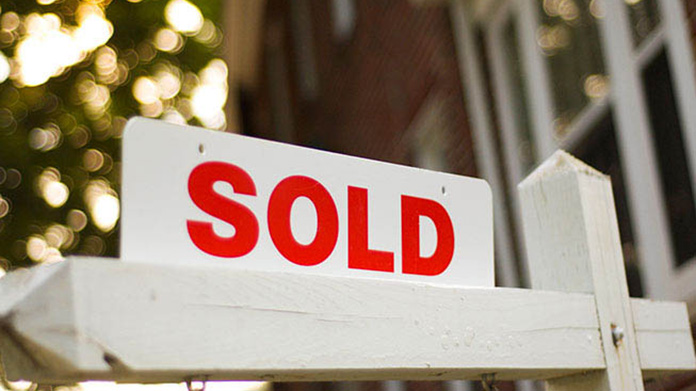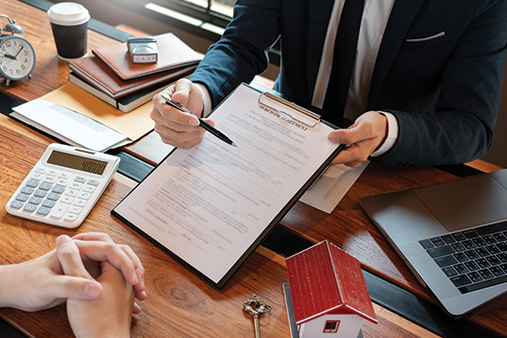How to Buy Wholesale Real Estate
Real estate wholesaling is a great way to start investing in real estate with little experience or capital. Wholesaling real estate can bring together homeowners and real estate investors.
Use this step-by-step guide to help you learn how to buy wholesale real estate.
Recommended: Be sure to read our guide on How to Start a Real Estate Investing Business.

Steps to Buying Wholesale Real Estate
Real estate wholesaling offers new investors the opportunity to familiarize themselves with real estate investing while mitigating the risk associated with buying a property outright.
Here are the steps to start wholesaling real estate:
Step 1: Find a House to Wholesale
Step 2: Evaluate the Property
Step 3: Find a Buyer
Step 4: Make an Offer
Step 5: Assign the Contract
What Is a Real Estate Wholesaler?
Before you learn all about the steps involved in real estate wholesaling, you should ask, What is a real estate wholesaler?
As a real estate wholesaler, you’ll negotiate contracts with homeowners to sell their off-market, distressed homes and present them to investors. The wholesaling houses have a sell-by date and are marked up from the agreed upon price with the seller, so the wholesaler can make a profit after selling the home to an investor.
How to Become a Real Estate Wholesaler?
Once you start your business and become a real estate wholesaler, you can search for properties that need updating or seem distressed. Wholesaling houses can be in areas near you or other locations. One helpful resource for finding distressed properties is foreclosure.com.
How to Find Real Estate Wholesaling Investors?
There are multiple ways to create a network of real estate wholesaling investors. You can get to know real estate agents, mortgage brokers, general contractors, and other wholesalers where you live. These professionals are a great resource and you can find them at real estate conferences, seminars, trade shows, conventions, and auctions. You can even host your own events to market yourself.
For more credibility and visibility, you can create a website, post on social media, and link the two accounts.
Create a business website to let potential clients and investors learn more about your wholesaling business, the services you provide, showcase properties, and share success stories.
Recommended: For everything you need to know about planning your new real estate wholesaling business, read a step-by-step breakdown in our guide to start a real estate wholesaling business.
Step 1: Find a House to Wholesale
The first step to buying wholesale real estate is to find properties that house flippers or other real estate investors will be interested in buying. Here is what you need to know to find great off-market properties:
Look for a Specific Type of Property
To effectively wholesale real estate, you ideally want to find distressed, off-market properties and buy them for below market value. Here is what to look for in a good real estate wholesaling opportunity:
- Deferred maintenance such as sagging gutters, long grass, or another form of yard/ exterior distress.
- An excess of mail or newspapers stacked on the front porch or stuck in the mail slot, indicating the home is vacant.
- Notices stuck to the front door.
Start the Search for Discounted Properties
To pique the interest of house flippers and real estate investors, you are ideally looking for off-market properties at a deep discount. There are several ways to find cheap houses to wholesale:
- Driving for Dollars — This is the most effective way to find cheap real estate to wholesale. Dedicate a few hours out of your week to drive in your town or city and look for properties that fit your specifications. Remember to bring a notepad and pen to keep track of potential properties.
- Bandit Signs — You’ve most likely seen a bandit sign at the corner of an intersection. These are essentially small scale billboards with contact information and a pointed message such as “Cash For Houses.”
- For Sale by Owner — This resource is a compilation of homes being sold by owners on a convenient, easy-to-use platform.
- Buy a List From a Provider — A local provider or real estate agent may be able to supply you with a list of potential properties to start your search in.
Recommended: Foreclosure.com is a great way to find local, low-cost (distressed, tax liens, etc.), foreclosed properties online that would otherwise be difficult to find. With a database that updates twice a day, you can quickly secure your next real estate investment deal and create new opportunities for your business.
Step 2: Research Potential Properties
Once you have a list of potential properties, do your research before making contact with the owner. This way, you will be able to vet potentially bad deals and provide yourself with the information needed to make the deal. Here are some ways you can find out more information about the properties and their owners:
- Skip Tracing — Skip tracing allows you to easily find the contact information of the property’s owners. This is a technique best used once you’ve found a potential property.
- Reverse Lookup — This method is essentially finding the owners of a house of interest with only the street address using a service such as backgroundchecks.org to obtain public records associated with the property.
When researching the property, you are looking for anything that will help you make an educated decision about how much to offer for the property or if it is even a deal worth pursuing. A few things to look for during a search are:
- The length of time the seller has owned property. Ideally, you want properties that have had the same owner for at least three to five years.
- The price of homes that have recently sold in the area within a mile radius.
- The reason for selling (if possible) such as a death in the family, divorce, or downsizing.
Any information you can find about the property or homeowner before making contact and visiting the property will help you make an informed decision about your offer amount.
Step 3: Make an Offer
If the evaluation of the property goes well, you will want to quickly make an offer. Keep in mind that a house flipper typically aims to pay 40%-60% of the after repair value (ARV), and as a wholesaler, you will receive between $5,000 to $10,000 per deal. So, when you are deciding on how much to offer, consider all of the following:
- How much the real estate investor will be able to sell the property for after rehabilitation
- The ideal amount of money you would like to make from the deal
- The amount of money the homeowner wants for the property
- The potential cost of repairs
Once you have decided on an amount to offer, you can draft an offer contract for the property. Legal documents should always be drafted with the assistance of your real estate attorney. A few things to keep in mind when drafting the contract:
- Addendums
An addendum is an attachment to a contract that modifies the terms and conditions of the original contract. Addendums are used to efficiently update the terms or conditions of many types of contracts. - Contingencies
A contingency clause contains any conditions that need to be met by either the buyer or seller in order to continue to the next stage of the contract. The purpose of contingencies is to protect both parties. If the contingencies are not met, the deal could fail to close due to a potential breach in the contract.
Tips for Negotiating the Deal
- Be Assertive
Even if this is your first time wholesaling real estate, being assertive about the offer you are making or any contingencies you may have will not only help you achieve your goals — it will give the seller the information they need to make a decision.
Most homeowners with distressed or unwanted properties are eager to sell their property. Being assertive can push the process along, which gets the property off of the homeowner’s hands as quickly as possible. - Do Your Research
Confidence is key to successfully negotiating an offer, and the more you know about the process, the more confident you will feel. Do as much research on the real estate wholesaling process as possible before you make an offer. Your research should include topics such as contract language and the escrow process.
Additionally, do your due diligence about the property you’re buying such as previous owners and the reason for selling (divorce, death, etc.) to help you navigate the conversation in a positive manner so that every party benefits. - Practice Makes Perfect
Get familiar with the talking points you plan to make and practice them in the mirror and the car with colleagues, friends, and family. Practicing your negotiation skills can strengthen your confidence and help ease any fear of public speaking you may have. - Empathize With the Homeowner
Selling a home often comes with emotional ties including grief or nostalgia. This process can be difficult for many homeowners and your empathy can make the experience a little more positive — not to mention potentially get you a good deal.
Moreover, a homeowner is more likely to sell to a person they like, which means communication is crucial. Wholesaling real estate puts your networking and communication skills to the test and can result in a great return! - Be Transparent
Lastly, make sure you are communicating with the homeowner about the wholesaling process and your intentions. This includes being clear about your role as a wholesaler: you are not personally buying the home but rather assigning it to an investor who will make the final purchase.
This is especially important during the negotiation process to ensure that you are not responsible for purchasing the home if you are unable to find a buyer or the buyer falls through. This should be clearly stated in the offer contract.
Draft and Present the Offer Contract
One of the most important things you will do as a real estate wholesaler is understand how to prepare offer contracts using a local real estate attorney. These documents will be used both during your acquisition of the property and when you transfer the property to another investor.
Ensure that your contract has information crucial to the success of your assignment. This includes:
- A statement verifying your right to market the property
- A statement verifying your right to assign ownership of the property before the closing date
- A statement verifying your right to show the property so long as you give the occupants 24-hour notice if you plan to show the property to prospective buyers
Step 4: Market the Property and Find a Buyer
In order to sell an acquired property, it needs to be marketed to potential real estate investors. This can include house flippers or real estate investors looking to lease the property.
Generally, you should have a minimum of ten investors on your roster. The amount of additional investors you source depends on a few variables, such as your knowledge level, current employment, investment capital, and comfortability.
How to Market to Real Estate Investors
You can find these buyers using many of the same methods, such as bandit signs and cold calling. Your intention should be to find investors that have:
- Joined the National Real Estate Investors Association (REIA)
- The capital to purchase properties without the use of hard mortgage money, loans, or private mortgage money
- An understanding and respect for beginning wholesalers
- Experience in cash real estate investments
- Local meetup events
It is important to note that you need to verify that you have the legal right to do so before you start marketing the property.
As noted in step two, a statement that confirms your right to market the property by the homeowner should be included in the offer contract. Moreover, you should consult with your local real estate attorney before marketing your property to ensure that you are following all legal requirements.
Make sure you have a complete understanding of what goes into a mortgage. Read our Mortgage Basics for LLC Owners guide.
Step 5: Assign the Contract
Once you have closed the deal with the homeowner, your next step is to complete an assignment contract with the real estate investor you have lined up. The assignment contract will state your agreed upon wholesaling fee for the property as well as any “Terms and Agreements” that are applicable.
Now that the contract has been signed, the assignment contract will go to your title company of choice, and the agreed amount for the property will go into escrow.
At this point, it is good practice to disclose to the homeowner that the contract assignment is complete and inform them of the fee you will be obtaining from the assignment. Full disclose ensures that you maintain a level of trust with your clients and allows all parties to feel their needs are being met.
Reinvest Your Profits and Grow Your Business
Now that you have had your first real estate wholesaling experience, you can reinvest your earnings to grow and expand your real estate wholesaling business. We recommend that you wholesale a few houses before altering your business model to include areas you are less familiar in.
Wholesaling real estate can be a lucrative endeavor. Whether you’re utilizing wholesaling as a supplement to your current income or plan to use your earnings as a sole source of income — this is a great place to start investing in real estate.
Make sure you’re working with the best mortgage lenders for your business. Read our Best Mortgage Lenders for LLC Owners review to learn more.





